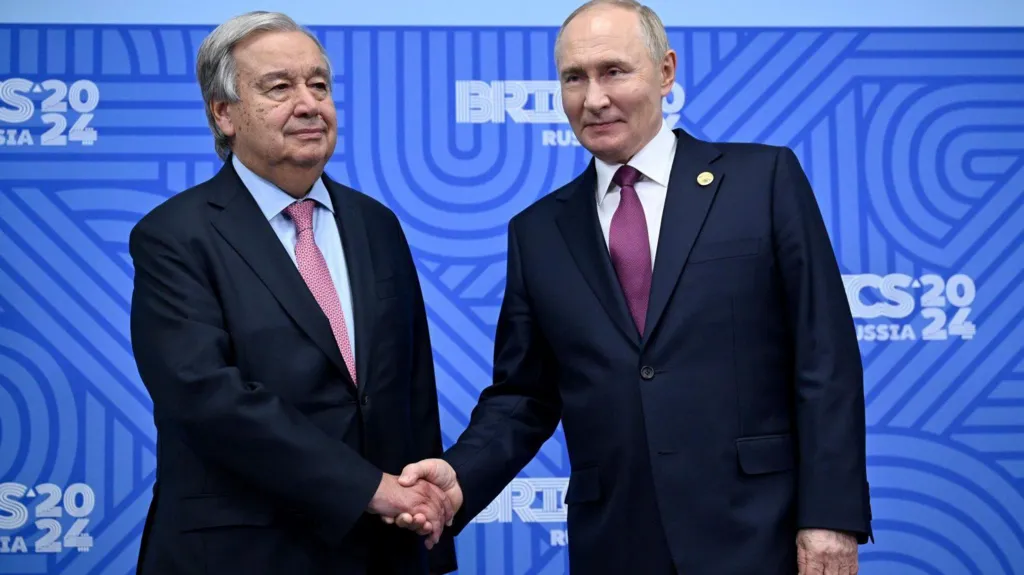Zelensky Rejects UN Chief Guterres Following His Russia Visit
3 min read
EPA-EFE/REX/Shutterstock UN Secretary General António Guterres (left) was seen shaking hands with Russian President Vladimir Putin in Kazan on Thursday

EPA-EFE/REX/Shutterstock UN Secretary General António Guterres (left) was seen shaking hands with Russian President Vladimir Putin in Kazan on Thursday
Ukrainian President Volodymyr Zelensky has declined a visit from United Nations Secretary-General António Guterres after Guterres’ recent trip to Russia. A source within the presidential office conveyed to the BBC that Zelensky’s decision stems from Guterres’ attendance at a summit in Kazan, where he engaged with Russian President Vladimir Putin.
“The president did not confirm his visit,” the source stated. “After Kazan, where he shook hands with the war’s instigator and spent UN Day in the territory of the aggressor country, it would be somewhat strange to host him here.”
Guterres’ visit to Russia, which launched a full-scale invasion of Ukraine in February 2022, was met with considerable disappointment across Ukraine. While there, he advocated for a “just peace” in Ukraine and reiterated to Putin that Russia’s invasion constituted a violation of the United Nations Charter and international law.
Prior to Guterres’ trip, the Ukrainian foreign ministry issued a statement criticizing his choice to visit Russia. “This is a wrong choice that does not advance the cause of peace. It only damages the UN’s reputation,” the statement read. It highlighted the contrast between Guterres’ acceptance of an invitation from Putin and his refusal to attend Ukraine’s first Global Peace Summit held in Switzerland.
The June summit, initiated by Ukraine and attended by over 90 nations, aimed to condemn Russia’s invasion and propose pathways to peace. In stark contrast, Moscow dismissed the event as meaningless due to its exclusion. The International Criminal Court (ICC) had issued an arrest warrant for Putin in 2023 over alleged war crimes in Ukraine, a charge that Russia does not recognize, complicating the situation further.
During the Brics summit in Kazan, Guterres asserted, “We need peace in Ukraine. A just peace in line with the UN Charter, international law, and General Assembly resolutions.” His office defended his participation in the summit, citing Brics’ role in fostering global cooperation.
The Brics group, established in 2006 by Brazil, Russia, India, and China, has since expanded to include South Africa, Iran, Egypt, Ethiopia, and the United Arab Emirates. Analysts suggest that Russia and China, two of the bloc’s significant players, are positioning Brics as a counterweight to the G7, a coalition of the world’s seven largest economies, which includes Canada, France, Germany, Italy, Japan, the UK, and the US.
Zelensky’s refusal to host Guterres emphasizes Ukraine’s frustration with what they perceive as a lack of strong action from the United Nations in response to the ongoing conflict. The Ukrainian leadership has been vocal about their expectations for the international community, particularly regarding the need for concrete measures against Russia.
Guterres’ meeting with Putin and his participation in the Brics summit, despite ongoing military actions and violations of international law, are seen as significant missteps. Many in Ukraine view his actions as undermining the UN’s credibility, particularly at a time when the organization is expected to take a strong stand against aggression.
As the war continues, Zelensky and his administration are looking for robust support from international allies, and actions perceived as conciliatory towards Russia could jeopardize Ukraine’s diplomatic standing. The country’s leaders have made it clear that they will prioritize partnerships that align with their struggle for sovereignty and justice.
This incident serves as a reminder of the intricate dynamics within international relations, where actions and gestures can have profound implications. The unfolding situation in Ukraine continues to draw the world’s attention, and the responses from global leaders and organizations will be critical in shaping the future of not just Ukraine, but broader geopolitical stability as well.
Zelensky’s decision not to host Guterres reflects a growing sentiment in Ukraine that the international community must take a firmer stance against Russia. The implications of these diplomatic moves will likely resonate far beyond the immediate context of the ongoing conflict.